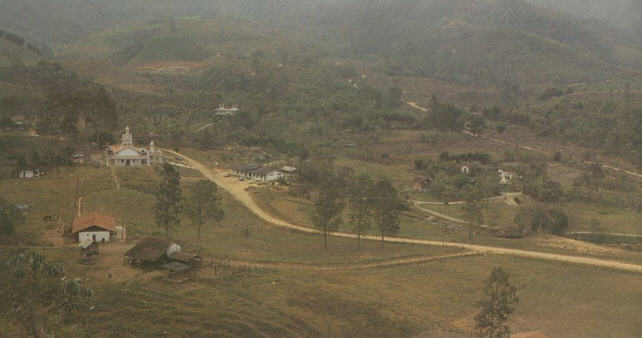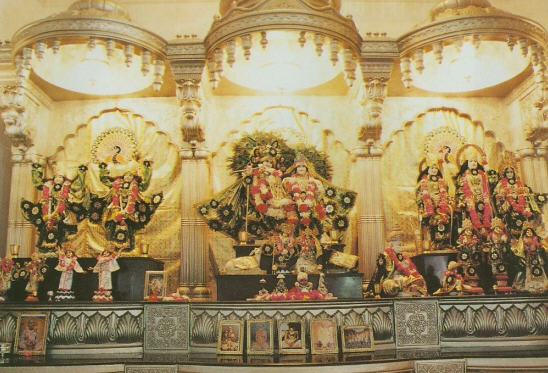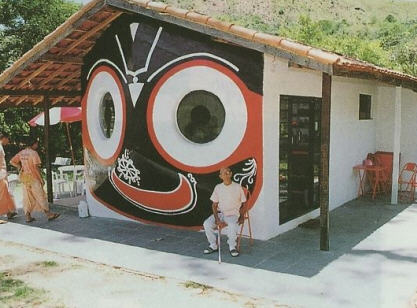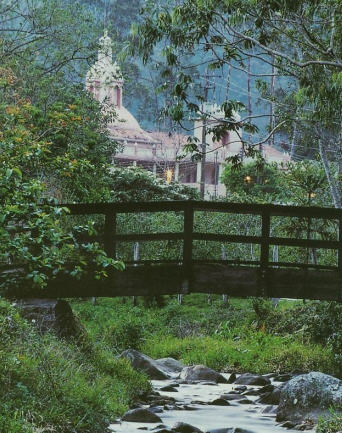
ISKCON Nova Gokula
Devotees at Nova Gokula are demonstrating how man can co-exist with nature and
prosper while conserving natural resources.
ACCEPTING KRSNA consciousness as the goal of life, a devotee saves time for Krsna's service by living simply. And what could be more simple than cultivating one's own fertile piece of land and living off nature's bounty?
Living off the land can be challenging. Yet Srila Prabhupada envisioned Krsna consciousness covering the world through the example of self-sufficient Krsna conscious farms. That may sound far-fetched, but just thirty years ago no one believed Srila Prabhupada's vision of Krsna temples and schools all over the world and millions of Krsna conscious books in every major language. Now all that has happened. What's happening with the farms?
Devotees in ISKCON's dozens of worldwide farm projects have taken steps, great and small, toward independence from modern society and dependence on nature and the land. They harness ox power, they protect cows and enjoy their milk, and they use dung for fuel and fertilizer. They grow grains, vegetables, and other useful crops. They build houses and temples. They rise early, chant Hare Krsna, and educate their children in Krsna conscious schools.
Sounds good but it's a long way from self-sufficiency. Most ISKCON farms rely on electricity from "the grid." Extra food comes from the supermarket, building supplies from the lumber yard. Cars get a lot more miles than ox carts. And the general medium of exchange is cash, not crops.
Government Help in Brazil
In their struggle toward self-sufficiency, devotees in ISKCON's Nova Gokula farm in Brazil are receiving support from an unexpected source: the Brazilian government. By Krsna's arrangement Nova ("new" in Portuguese) Gokula (the rural village of Lord Krsna's youth) lies right in the heart of one of the world's ecological hot spots. As a result, a lot of influential people suddenly have a pressing interest in the success of Nova Gokula as an ideal self-sufficient community.

In 1978 devotees founded Nova Gokula in Brazil's Atlantic rain forest, about two hours from San Paulo. Coffee barons, coal producers, and cattle ranchers had deforested the land. Gradually the devotee farmers began to fill in the stripped landscape with crops, fruit trees, and wonderfully landscaped meditation gardens. They built schools, a guest house, a barn for the cows, simple homes, and at the heart of the community, a beautiful temple for Sri Sri Radha-Gokulananda. More than 230 devotees now live in Nova Gokula.
Meanwhile, worldwide concern was growing over the destruction of the Brazilian rain forest. Finally, in 1985, the Brazilian government passed laws creating a forest preserve in part of the only remaining five percent of the primal Atlantic rain forest the very site surrounding Nova Gokula. Their main incentive: sweet, fresh water, a commodity the U.N. predicts will dominate twenty-first-century politics instead of oil.
Lord Krsna has blessed Nova Gokula with abundant, excellent water. In addition to thirty-six pure springs that dot the landscape, the rushing Yamuna (renamed by the devotees after the holy river of the original Gokula) splashes over large rocks as it winds through Nova Gokula to the nearby Paraiba River. The devotees swim and bathe in the cool, clear Yamuna waters, chemically more pure than water you might buy in a grocery store.
The Paraiba serves Rio de Janeiro and Sao Paulo, Brazil's two largest cities, as well as the country's industrial heartland. So polluted is the Paraiba that the town of Pindamonhangabha, about twenty-five kilometers from Nova Gokula, faces a serious threat to its future water supply. Through research the Brazilian government has determined that the Yamuna will be an important source of fresh water for Pindamonhangabha. They also discovered that to protect the water, the surrounding forests must be returned to their condition prior to modern man's pillaging.
Developing the Plan
Nova Gokula resident Rupa Gosvami Dasa proposes restoring the forest in harmony with a self-sustaining agrarian community. The community will demonstrate how man can co-exist with nature and prosper while conserving natural resources. Taking interest in Rupa Gosvami Dasa's unique proposition, thirty-five highly trained representatives from a variety of governmental and private organizations attended a recent conference in Nova Gokula. They proposed various components for a master plan for Nova Gokula, including:

• Fire brigade equipment to control brush fires (still started by local cattle ranchers)
• Training for development of special bee hives for producing honey and other bee products
• Training for cultivating and harvesting medicinal plants, including those used for Ayurvedic treatments
• Information on producing palm heart, a highly prized food product
• Training for extracting oils from tropical seeds
• Tens of thousands of native seedlings, and skilled advice on their planting and care
• Help improving the local access road
• Help for leveling portions of the hilly land for improved cultivation and future construction (just as the Lord's incarnation Prthu Maharaja leveled the earth, Rupa Gosvami Dasa points out)
• Help creating a special zoo for reorienting to their native environment valuable animals recovered from poachers
• Advice for growing crops to be used for feeding a family or for commerce and trade
• Assistance in developing cottage industries and ecotourism for economic development.
The government provided funds for the development of this plan. Recently unveiled at the fourth annual Brazilian forestry convention, the Nova Gokula plan stands alone among hundreds of reforestation projects for a simple reason: it's the only one involving a community living in harmony with the forest. Rupa Gosvami Dasa credits Srila Prabhupada with the inspiration and vision that has now captured the interest of many Brazilian scientists and officials.
Srila Prabhupada: World's Greatest Ecologist
Among his many other gifts, Srila Prabhupada also endowed the world with the model of Vedic village life. It's more than tree-hugging; Prabhupada taught not only how to live off the land in a harmonious, sustainable way, but why it makes perfect sense for anyone to do so. Isavasya, or a God-centered way of life, forms the foundation of any truly sustainable, ecologically balanced way of life.

Elaborating on this theme, Srila Prabhupada's disciple Ranchor Dasa explains the Vedic model in his book Hinduism and Ecology: Seeds of Truth. Each householder, he writes, surrounds his house with local fruit and nut trees. This mini-forest, called Srivana, helps sustain the family. Surrounding the Srivana is Tapavana, named for austerity. Here one finds knowledge in the form of renounced saints and their schools and asramas. Passing through Tapavana one enters the greater forest, or Mahavana. Local people understand the Mahavana to be an uninhabited area set aside as the domain of local plants and animals. Nova Gokula's reforestation plan will follow this concept.
The government's support of Nova Gokula's master plan is not its first assistance for the devotees. Local authorities provided $50,000 to help construct the Varnasrama College, the Nova Gokula school for older boys. Neighbors are also urging their leaders to make the temple gurukula the official public school for the local area. Some of their children have attended academic classes at the gurukula day school with wonderful results.
"My son was always unhappy at the other school," one father said. "When he comes home from this school, he is glowing."
A large gurukula school is included in the Nova Gokula master plan.
Funding the entire Nova Gokula master plan development will cost a substantial amount of money, but Rupa Gosvami Dasa is confident.
"Some of Brazil's top ecologists see our plan as the most practical hope for man and nature to survive cooperatively. This land is among the most biodiverse on earth, with as many as 460 native species found on each hectare. India's Vedic heritage, as presented by Srila Prabhupada, is a proven alternative to Brazil's historical destruction of its forests. The Manu Samhita has perhaps the oldest written admonition against water pollution. So bringing Krsna consciousness to the Brazilian rain forest is a positive and natural step for everyone."
Kalakantha Dasa, a disciple of Srila Prabhupada since 1972, helps ISKCON temples build congregations. He lives with his family in Gainesville, Florida.
